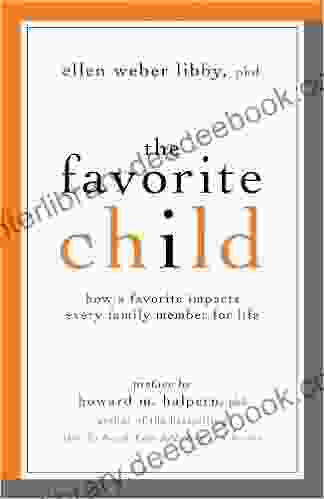How Favoritism Impacts Every Family Member For Life

Favoritism, a widespread phenomenon within families, involves the preferential treatment of one child over others. This bias can manifest in various forms, ranging from subtle differences in attention and affection to overt displays of favoritism. While favoritism may be intended as a way to show extra support or nurture a specific child's strengths, its consequences often extend far beyond the intended recipient, leaving an indelible mark on the entire family dynamic. In this comprehensive article, we will explore the profound and enduring impact of favoritism on each family member, examining its effects on siblings, parents, and the family as a whole.
Impact on Siblings
Siblings raised in an environment marked by favoritism face a unique set of challenges. The favored child may receive preferential treatment in terms of attention, resources, and opportunities, leading to feelings of resentment and inadequacy among their siblings. This can disrupt sibling relationships, creating a sense of division and competition within the family. In severe cases, favoritism can contribute to estrangement and long-term conflict between siblings.
4.2 out of 5
| Language | : | English |
| File size | : | 2183 KB |
| Text-to-Speech | : | Enabled |
| Screen Reader | : | Supported |
| Word Wise | : | Enabled |
| Print length | : | 302 pages |
Case Study: In the case of the Rodriguez family, favoritism towards the eldest child, Maria, had a detrimental impact on her younger brother, Carlos. Maria consistently received more praise, attention, and privileges, leaving Carlos feeling neglected and resentful. Over time, this favoritism eroded the bond between the siblings, resulting in a distant and strained relationship.
Emotional and Psychological Effects
Favoritism can have profound emotional and psychological effects on siblings. The neglected child may experience feelings of low self-esteem, insecurity, and anxiety. They may also develop a negative self-image, believing that they are less worthy of love and attention than their favored sibling. These feelings can persist throughout adulthood, impacting the individual's relationships, career, and overall well-being.
Expert Insight: Dr. Emily Carter, a clinical psychologist specializing in family dynamics, emphasizes the importance of addressing the emotional needs of all children in the family. "Favoritism can create an atmosphere of competition and insecurity, which can be damaging to siblings' emotional health," she says. "It is crucial for parents to recognize the consequences of favoritism and to make a conscious effort to treat all children fairly and equitably."
Behavioral Consequences
In addition to emotional and psychological effects, favoritism can also lead to negative behavioral consequences for siblings. The neglected child may engage in attention-seeking behaviors or withdraw from social interactions altogether. They may also exhibit aggression towards their favored sibling or other family members. These behaviors can further disrupt family harmony and create a hostile environment.
Research Study: A study published in the Journal of Family Psychology found that children who perceived favoritism towards their siblings were more likely to engage in externalizing behaviors, such as aggression and rule-breaking, as well as internalizing behaviors, such as anxiety and depression.
Impact on Parents
Parents who engage in favoritism may face their own set of challenges and consequences. They may experience feelings of guilt and shame for treating their children unequally. They may also struggle to maintain a positive relationship with the neglected child, who may harbor resentment towards their parents. Favoritism can also strain the relationship between the parents, as one parent may feel responsible for or complicit in the unfair treatment of their child.
Case Study: In the case of the Johnson family, favoritism towards the youngest child, Emily, created a rift between the parents. The mother, Sarah, felt guilty for favoring Emily over her older brother, Michael. The father, David, resented his wife's preferential treatment of their daughter. This conflict led to tension and communication problems within the marriage.
Emotional and Psychological Effects
Favoritism can take an emotional toll on parents. They may experience feelings of guilt, shame, and anxiety over the unfair treatment of their children. They may also struggle to connect with the neglected child, who may perceive them as biased and unloving. These feelings can lead to depression, anxiety, and relationship problems for the parents.
Expert Insight: Dr. Mark Jenkins, a licensed family therapist, highlights the importance of parental self-awareness and accountability. "Parents need to be aware of their own biases and motivations," he says. "If they find themselves favoring one child over another, it is crucial to address the issue and work towards treating all children fairly."
Relationship Dynamics
Favoritism can also disrupt the relationship between the parents and the favored child. The favored child may develop a sense of entitlement and superiority, believing that they are more deserving of attention and affection than their siblings. This can lead to conflict and resentment within the family, as the favored child may become alienated from their siblings and other family members.
Research Study: A study published in the Journal of Social and Personal Relationships found that children who perceived favoritism towards themselves were more likely to have negative relationships with their parents and siblings.
Impact on the Family as a Whole
Favoritism can have far-reaching consequences for the family as a whole. It can disrupt family harmony, create division among siblings, and damage the relationships between parents and children. It can also lead to low self-esteem, anxiety, and depression for the neglected child, as well as guilt and shame for the parents. In extreme cases, favoritism can contribute to family estrangement and the breakdown of family relationships.
Case Study: In the case of the Patel family, favoritism towards the eldest son, Ravi, led to a breakdown in communication and cooperation within the family. Ravi received preferential treatment in terms of education, financial support, and career opportunities. His siblings, Reshma and Samir, felt neglected and resentful. Over time, the siblings became estranged from Ravi and from each other, and the family as a whole was fractured.
Disrupted Family Harmony
Favoritism can create a toxic atmosphere within the family, making it difficult for members to feel safe, loved, and respected. The favored child may become the center of attention, while the neglected child may feel excluded and isolated. This can lead to conflict, jealousy, and resentment among siblings, and can strain the relationships between parents and children.
Research Study: A study published in the journal Child Development found that families in which favoritism was present were more likely to experience conflict and emotional distress than families in which favoritism was not present.
Division Among Siblings
Favoritism can drive a wedge between siblings, creating a sense of division and competition within the family. The favored child may feel superior to their siblings, while the neglected child may feel inferior. This can lead to resentment, conflict, and estrangement between siblings, which can persist into adulthood.
Expert Insight: Dr. Susan Newman, a renowned parenting expert and author, emphasizes the importance of treating all children fairly and respectfully. "Favoritism can create a hostile and competitive environment within the family," she says. "Parents need to make a conscious effort to show love and attention to all their children, and to avoid making unfair comparisons."
Favoritism is a complex and widespread issue that can have profound and long-lasting consequences for every member of the family. It can damage sibling relationships, strain the relationship between parents and children, and disrupt family harmony. The emotional and psychological effects of favoritism can persist throughout adulthood, impacting individuals' self-esteem, relationships, and overall well-being. It is crucial for parents to recognize the harmful effects of favoritism and to make a conscious effort to treat all children fairly and equitably. By creating a supportive and inclusive environment, parents can help to foster healthy sibling relationships and build a strong and cohesive family bond.
4.2 out of 5
| Language | : | English |
| File size | : | 2183 KB |
| Text-to-Speech | : | Enabled |
| Screen Reader | : | Supported |
| Word Wise | : | Enabled |
| Print length | : | 302 pages |
Do you want to contribute by writing guest posts on this blog?
Please contact us and send us a resume of previous articles that you have written.
 Novel
Novel Text
Text Genre
Genre Library
Library Paperback
Paperback E-book
E-book Sentence
Sentence Bookmark
Bookmark Shelf
Shelf Glossary
Glossary Bibliography
Bibliography Foreword
Foreword Preface
Preface Annotation
Annotation Footnote
Footnote Scroll
Scroll Codex
Codex Tome
Tome Bestseller
Bestseller Narrative
Narrative Encyclopedia
Encyclopedia Narrator
Narrator Resolution
Resolution Librarian
Librarian Catalog
Catalog Card Catalog
Card Catalog Stacks
Stacks Research
Research Scholarly
Scholarly Academic
Academic Journals
Journals Reading Room
Reading Room Rare Books
Rare Books Special Collections
Special Collections Interlibrary
Interlibrary Study Group
Study Group Thesis
Thesis Storytelling
Storytelling Awards
Awards Book Club
Book Club Page Turner
Page Turner Marvin Tile
Marvin Tile Jane Kurtz
Jane Kurtz Margaret Rozga
Margaret Rozga William Gibbons
William Gibbons A S Byatt
A S Byatt Wayne Lemmons
Wayne Lemmons Mary H Rubin
Mary H Rubin Partha Chatterjee
Partha Chatterjee Rebecca Currington
Rebecca Currington Gayathri Venkatachalapathi
Gayathri Venkatachalapathi Bhakti Vikasa Swami
Bhakti Vikasa Swami Patrick Grady
Patrick Grady Amaka Samrah Linus
Amaka Samrah Linus Derek S Reveron
Derek S Reveron Mike Duran
Mike Duran Tudor Jones
Tudor Jones Anne Clermont
Anne Clermont Michael L George
Michael L George Alyssa Bailey
Alyssa Bailey
Light bulbAdvertise smarter! Our strategic ad space ensures maximum exposure. Reserve your spot today!

 Benjamin StoneFractured Skies: Distant Horizon - Soar Through the Heavens in a Shattered...
Benjamin StoneFractured Skies: Distant Horizon - Soar Through the Heavens in a Shattered... William GoldingFollow ·2.9k
William GoldingFollow ·2.9k Efrain PowellFollow ·12.5k
Efrain PowellFollow ·12.5k George OrwellFollow ·19.9k
George OrwellFollow ·19.9k José SaramagoFollow ·15.7k
José SaramagoFollow ·15.7k William ShakespeareFollow ·5.7k
William ShakespeareFollow ·5.7k Robert Louis StevensonFollow ·16.4k
Robert Louis StevensonFollow ·16.4k Kazuo IshiguroFollow ·9.2k
Kazuo IshiguroFollow ·9.2k Banana YoshimotoFollow ·3.7k
Banana YoshimotoFollow ·3.7k

 Bo Cox
Bo CoxDiscover the Enchanting Allure of Collingwood, Ontario,...
Nestled amidst the breathtaking landscape of...

 Ralph Ellison
Ralph EllisonThe Street of Clocks Poems: A Poetic Journey Through Time
Welcome to The Street...

 Dwight Blair
Dwight BlairCritical Political Economy of the Middle East and North...
The Middle East and...

 Deion Simmons
Deion SimmonsPerfect Strategies For Painting Amazing Marine Creatures...
Gouache is a...

 Hugh Bell
Hugh BellThe American Republic: Constitution, Tendencies, and...
The American Republic,...
4.2 out of 5
| Language | : | English |
| File size | : | 2183 KB |
| Text-to-Speech | : | Enabled |
| Screen Reader | : | Supported |
| Word Wise | : | Enabled |
| Print length | : | 302 pages |












